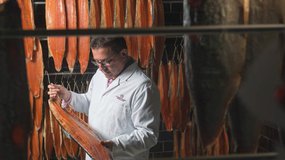One company changed its short- and long-term planning to survive and discovered new opportunities

Effective planning allows a business to better navigate unexpected events
As a facilities management company specialising in commercial cleaning, Kerryn Jones thought that coronavirus and the lockdown would not affect her business. However, within days of the first of the lockdowns Frontline Cleaning's turnover fell by 85 per cent. As a result, most of the company’s staff went on furlough and Kerryn's husband, Matt, did the bulk of the physical work of cleaning.
“We were unsure as to what the next step would be and unsure whether we would even survive it,” said Kerryn. “Everyone expected the cleaning sector to be one of the sectors to do well during the pandemic. However, our main source of income was offices so, as each one shut and people worked from home, Frontline Cleaning became redundant.”
Looking externally
Aware that in this challenging environment the company’s short- and long-term planning would have to change, Kerryn sought professional help. She and Matt recruited the help of a specialist consultancy. The firm helped the couple to rethink their short- and long-term goals and how they were going to achieve them.
“We decided to take the opportunity given to us to make a plan,” Kerryn explained. “With less staff to manage and just treading water in the business, our consultant advised us of the best way to utilise the time most effectively.”
Kerryn explained: “We needed help. I felt like I was losing control of everything that we’d spent over a decade building. Both our incomes rely on the business and my heart went out to all our staff who also relied on Frontline Cleaning.” When the couple furloughed their contracts manager, they realised that a lot of the information about the company’s contracts was in their heads. “We had no idea what was going on in our own business. It made me feel out of control and fearful.”

Kerryn Jones utilised the help of someone outside the business to refocus plans
Changing systems and processes
With guidance from their consultant, Kerryn and Matt developed a new short-term plan which consisted of using the furlough scheme, with the couple also taking on as much of the work as possible themselves. Another change in short-term planning involved keeping a closer eye on the various clients that had paused their cleaning contracts and keeping in touch with them to let them know that Frontline was still available to help.
“We did a complete overhaul of all our systems and processes,” said Kerryn. “We organised, planned and revitalised every nook and cranny of the business. We made sense of the mess we were in and made plans to make sure that we could emerge stronger and more in control than we were before coronavirus.”
With this change of short- and long-term planning, Frontline now has processes, uniformed documents, new online systems and a future plan. As staff have come back to work and contracts with customers have resumed, the team have been able to implement these new arrangements and thereby established strong foundations for the growth of the business. “If our contracts manager goes on holiday, we won't fall apart because we can continue to follow the processes and make sure everything runs smoothly,” said Kerryn.
Kerryn and Matt’s experience is typical of many SMEs, according to their consultant. He started by helping them to establish a longer-term view of their ideal future.
“She visualised an improved, growing business and worked systematically to bring this to pass,” he said. “The environment was changing so quickly that we used the longer-term view as a North Star, providing a point of reference more than a specific long-distance roadmap. As life began to settle down and a clearer picture emerged of what the future held, we slowly began to extend the strategic time frame, but not by far.”
With her previous coaching, Kerryn had been encouraged to simply write a list of targets for every 90-day period. However, her new consultant looks at the different sections of the business and targets that need to be met in each section as well as looking at the overall layout of the business and how it can be improved.
He advises small and medium business leaders to keep reviewing their long-term as well as their short-term planning. “Your strategic thinking is a vital, living, life-giving exercise that should flex with your business environment, constantly testing the future for upcoming opportunities and threats to which appropriate responses can be made by deploying well-organised capabilities for maximum effect.”
-
website: frontlinecleaning.co.uk/
-
location: West Midlands (England)
-
business size: 10-49 People
-
business type: Consumer Goods
Lessons learnt
While it might be tempting to try and solve everything internally, investing in outside help can often produce a great return.
Kerryn learnt the hard way that her business didn't have the systems in place to support the company during challenging times. She made sure a positive emerged from a negative.
Unfortunately plans start becoming dated the minute you finish them. Setting time aside to review and update will help keep your business on track to achieve what you want it to.
